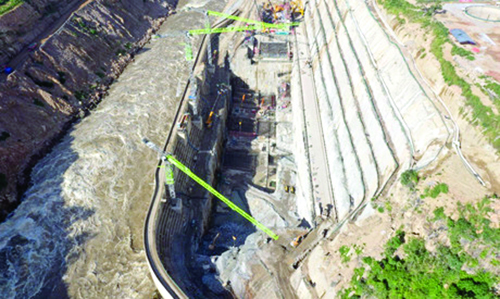The latest developments in the dispute over the Grand Ethiopian Renaissance Dam (GERD) are uppermost in most people’s minds, all the more so since the recent session of the UN Security Council.
The Ethiopian media have devoted countless column inches and sound bites to erroneous claims that Egypt is against Ethiopia’s development.
However, the Egyptian Irrigation Ministry has repeatedly stressed that this is not the case.
Rather, Egypt opposes any unilateral action taken by any upstream nation without considering the interests of its downstream neighbours.
Co-operation between the riparian countries in the study, implementation and operation of dams and infrastructure projects would be the ideal model for achieving mutual benefit and strengthening neighbourly relations.
Egypt has been trying by all diplomatic means to maintain this ideal in its relations with the Nile Basin countries, while reaching a legally binding agreement to fill and operate the GERD.
Irrigation Minister Mohamed Abdel-Aati has emphasised multiple times that throughout history, Egypt has been and is still keen to provide support in financing, building, and preparing technical studies for the construction of dams in a way that meets the aspirations of all countries involved.
Egypt has offered support for many dams – Jabal el-Awliya in Sudan, the Owen in Uganda, the Rovinj in Tanzania and the Wau in South Sudan.
Wau multi-purpose
The Egyptian and South Sudanese ministries of water resources and irrigation recently signed a co-operation protocol to prepare feasibility studies for the construction of the multi-purpose Wau Dam in South Sudan.
The project is located on the Siwi River, one of the main branches of the Jur River in the Bahr Al-Ghazal Basin, 9km south of the city of Wau in southern Sudan.
The dam will generate (10.4 MW, 64 Gwh/year) of electricity and supply 500,000 people with fresh water and provide supplementary irrigation for 30,000-40,000 feddans (acres).
This is part of Egypt’s continued support for African countries.
Stiegler’s Gorge, Tanzania
An Egyptian consortium of Arab Contractors and El-Sewedy Electric is undertaking this $2.9 billion dam for development in Tanzania. The goal is to control flooding of the Rufiji River, generate power and conserve the environment.
The 2,115MW of generated electricity will meet Tanzania’s energy needs.
The dam will regulate water levels during the flood season and satisfy local demand for water.
Owen and weed control, Uganda
Egypt has helped build the Owen Falls Dam in Uganda in 2020. Ugandan Minister for Agriculture, Animal Industry and Fisheries Vincent Bamulangaki wrote on behalf of his government thanking Egyptian Minister of Water Resources and Irrigation for its support in aquatic weed control in the equatorial lakes.
This move came as part of the Uganda-Egypt Aquatic Weed Control Project to remove the water hyacinth on more than 100 feddans near Port Bell and Owen Falls.
Technical Support for Congo
Egypt has also offered Democratic Republic of the Congo technical support for a flood forecasting centre in the Congolese capital Kinshasa.
Water management training
Egypt has been organising training courses for African personnel in the management and use of underground water. Trainees were from Sudan, South Sudan, Ethiopia, Uganda, Kenya, Tanzania, Rwanda, Burundi, Democratic Republic of Congo, Eritrea, Ghana, Zambia, Malawi, Cameron and Burkina Faso.
More co-operation projects
The minister of irrigation added that Egypt has implemented many bilateral co-operation projects with Nile Basin countries over the past years in water and power linkage. Egypt has established several rainwater harvesting dams and underground drinking water stations to supply remote areas.
Egypt has supported the creation of fish farms and river marinas to serve local communities, in addition to cleaning waterways and developing the surrounding areas, create jobs, developing fishing, and clear swamps that harbour dangerous diseases.
Co-operation with African countries is top priority for the Egyptian government as Egypt does not hesitate to support all African countries, the water and irrigation minister said.
Through this co-operation, many development projects are implemented, which contributes to sustainable development, raising livings standards, and enhancing the ability to face the challenges of overpopulation, poverty, illiteracy and disease, the minister added.
(See related story on Page 5)






Discussion about this post